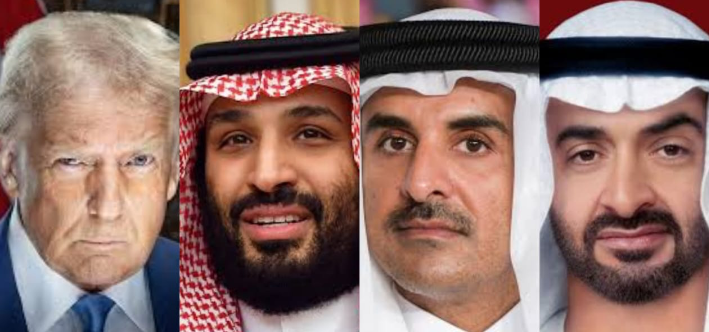
Trump’s Curious Attraction to the Arab-Muslim World
By Yassim Dukawuya
Not everyone likes him. In fact, Donald J. Trump, the 45th and now 47th President of the United States, having returned to power after reelection, has been described by critics as a bully, an eccentric, and even a promoter of the theatrics of WrestleMania. Yet, love him or loathe him, Trump remains one of the most enigmatic and unconventional leaders in American history—often saying the unsayable and doing the unexpected.
One of the most symbolic gestures of his presidency was his choice of destination for his first official foreign visit during his first term in May 2017: the Arab-Muslim world. His itinerary took him to Saudi Arabia, Israel, and the Vatican, but it was his engagement with the Arab Gulf states that captured global attention.
Similarly, in his inaugural state visit of his second term in office in May 2025, Trump again prioritized the Arab-Muslim nations of the Middle East.
It is important to note that while not all Muslim countries are Arab—such as Turkey, Iran, Pakistan, or Indonesia—Trump’s focus has consistently been on the wealthiest Arab Gulf monarchies, namely Saudi Arabia, Qatar, and the United Arab Emirates (UAE). His approaches to these nations have sharply contrasted with his frosty rhetoric toward NATO allies, China, and, controversially, his overtures toward Russian President Vladimir Putin.
While the world anticipated an escalation of the Ukrainian-Russian conflict, especially given NATO’s support for Ukrainian President Volodymyr Zelensky, President Trump took a divergent path. He has frequently expressed admiration for President Putin, even withholding critical support and sophisticated arms from Ukraine.
Similarly, on Iran—America’s long-standing adversary—Trump adopted an aggressive stance during his first tenure, withdrawing the U.S. from the Joint Comprehensive Plan of Action (JCPOA) in 2018 and threatening military action. In his second tenure, he again threatened military strikes, yet paradoxically softened his tone at times, welcoming backchannel negotiations through Qatar—a key U.S. ally and regional diplomatic powerhouse under the leadership of Emir Sheikh Tamim bin Hamad Al Thani.
Qatar has played a pivotal role in facilitating indirect talks between the United States and Iran. Meanwhile, Saudi Arabia, under the leadership of Crown Prince Mohammed bin Salman (MBS), has hosted preparatory meetings aimed at exploring the possibility of mediating between Russia and Ukraine—a remarkable diplomatic feat, given the kingdom’s strategic ties with both countries.
Immediately after his reelection, Trump extended an invitation to influential Arab investors, notably Emirati billionaire Hussain Sajwani, Chairman of DAMAC Group, signaling his desire to attract billions of dollars in Gulf investment into the U.S. economy.
Given these developments, it is hardly surprising that Trump prioritized Saudi Arabia, Qatar, and the UAE for his first state visit of his second tenure. Beyond the billions of dollars in business deals covering arms sales, technology, energy, and infrastructure, his visit also carried deeper socio-political undertones.
One of the most startling moments of Trump’s Middle East diplomacy was his willingness to engage with unconventional players. In Riyadh, he met with Ahmed al-Sharaa, the leader of a rebel group that overthrew Syria’s longtime strongman Bashar al-Assad. Trump thus became the first U.S. president in over two decades to meet a Syrian leader, offering sanctions relief in hopes of charting a new path for the war-battered country.
Moreover, Trump—contrary to his earlier hawkish postures—adopted a surprisingly reconciliatory tone toward Iran during his remarks in the Gulf, hinting that progress was being made toward resolving the nuclear impasse.
In a nutshell, regardless of how he is perceived globally, President Trump is a leader who plays a complex game of geopolitical chess, where threats and bravado often serve as tools for negotiation and deal-making.
His engagement with the Arab-Muslim world, particularly with some of the wealthiest nations, portrays him not as an Islamophobe—as some critics allege—but as a pragmatic leader willing to recalibrate relationships for mutual benefit.
Trump’s leadership style, though bewildering, has demonstrated moments of unexpected diplomacy that arguably contributed to global stability, transcending his often-controversial America First slogan.
Beyond his state visits focused on strengthening economic partnerships, advancing U.S. strategic interests, and reinforcing diplomatic ties IN Riyad, Doha and Abu Dhabi, these gestures reflect a leader who, despite the controversies, understands the strategic, economic, and geopolitical importance of the Arab-Muslim world and seeks to reassure them that America prefers dialogue over perpetual conflict.
Whether Israel is happy with these developments remains unclear.
Yassim Dukawuya writes from Kofar Famfo, Kano City [email protected]
